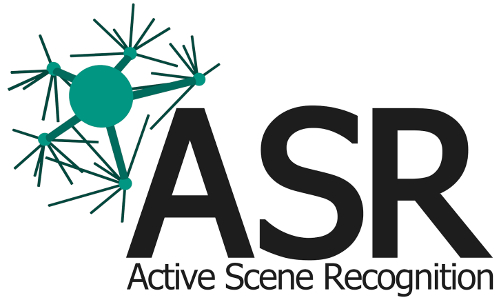Show EOL distros:
Package Summary
This package provides object pose prediction on the basis of the alternative scene model PSM (Probabilistic Scene Model): It generates hypotheses (type and pose) for missing objects in the context of 3D object search. Moreover, it integrates scene recognition and object pose prediction (both on the basis of PSM) into Active Scene Recognition. Its output are asr_next_best_view/AttributedPointCloud.msg messages which can be processed by asr_next_best_view.
- Maintainer: Meißner Pascal <asr-ros AT lists.kit DOT edu>
- Author: Braun Kai, Meißner Pascal
- License: BSD
- Source: git https://github.com/asr-ros/asr_recognizer_prediction_psm.git (branch: master)
Package Summary
This package provides object pose prediction on the basis of the alternative scene model PSM (Probabilistic Scene Model): It generates hypotheses (type and pose) for missing objects in the context of 3D object search. Moreover, it integrates scene recognition and object pose prediction (both on the basis of PSM) into Active Scene Recognition. Its output are asr_next_best_view/AttributedPointCloud.msg messages which can be processed by asr_next_best_view.
- Maintainer: Meißner Pascal <asr-ros AT lists.kit DOT edu>
- Author: Braun Kai, Meißner Pascal
- License: BSD
- Source: git https://github.com/asr-ros/asr_recognizer_prediction_psm.git (branch: master)

Contents
Description
This package provides object pose prediction on the basis of the alternative scene model PSM (Probabilistic Scene Model): It generates hypotheses (type and pose) for missing objects in the context of 3D object search. Moreover, it integrates scene recognition and object pose prediction (both on the basis of PSM) into Active Scene Recognition. Its output are asr_next_best_view/AttributedPointCloud.msg messages which can be processed by asr_next_best_view.
There are two launch files. The first launches the PSM pose prediction (launch/psm_node.launch). The second starts the PSM pose prediction with given likelihoods (launch/recognizer_prediction_psm.launch).
Functionality
Builds a scene graph of each given scene and occupies nodes (objects) with the given unobserved objects (evidences). Based on the absolute positions of the observed objects the relative poses are calculated by sampling the Gaussian Mixture Models of the child nodes. The number of hypotheses is spread equally to each unobserved object. If there is more than one observed object, the first object in the object list that is part of the scene will be treated as reference objects. The reference object is the root node of the scene graph.
Output: asr_next_best_view/AttributedPointCloud pose_hypothesis (see topics) and bool all_scene_objects_found: true if all scene objects of ALL scenes in the .xml have been found. The automat can then go to success state, false otherwise.
Usage
Needed packages
asr_msgs(for AsrObject)
AsrNextBestView (for AttributedPointCloud msg)
AsrKinematicChain (for the transformation to given frames)
Needed software
AsrObject msgs (so you need asr_flir_ptu_driver, asr_resources_for_vision and a recognizer, e.g. asr_aruco_marker_recognition)
- for scene probabilities you need AsrPSM inference.
- Eigen
- Boost
Start system
with inference:
start roscore and the kinematic chain:
roslaunch asr_kinematic_chain_dome transformation_publishers_for_kinect_left.launch
start the server: roslaunch asr_recognizer_prediction_psm psm_node.launch
without inference:
start roscore and the kinematic chain (see above).
start the server: roslaunch asr_recognizer_prediction_psm recognizer_prediction_psm.launch
Visualization: Start RViz (rviz) and open the config file doc/recognizer_prediction_psm. rviz
Simulation
Only differs from real application in source of observed object messages.
ROS Nodes
Published Topics
- /stereo/visualization_marker_array
/asr_next_best_view::AttributedPointCloud (see services)
Parameters
with inference: (psm_node.launch)
string path - path to the xml file that contains the scenes (e.g. models/breakfast.xml)
string[] bag_filename_list: the object trajectories. These are generated during AsrPSM training.
uint32 num_votes: the overall number of hypotheses that should be generated.
string base_frame_id: the base frame to which the observed objects and the hypothesis should be transformed into.
without inference:
string path: see above
string[] scenes: the name of the scenes. It generates hypotheses only for these scenes.
float32[] scene_probabilities: contains the probability of the scene.
uint32 num_votes: the overall number of hypotheses that should be created.
asr_msgs::!AsrObject[] objects: the list of all observed objects.
string base_frame_id: see above.
The number of the scene_probabilities has to be equal to the number of scenes.
The sum of the scene_probabilites should be 1.0, otherwise the number of hypotheses will not be correct.
There has to be at least one observed object.
further parameters:
In the recognizer_prediction_psm.launch file you can set the lifetime of the rviz markers. You can also enable additional console output for debugging.
AsrPSM parameters (compare there) are stored in param/properties.yaml
Needed Services
asr_msgs::!AsrObject[] objects: input. The list of all observed objects (with inference)
Provided Services
/recognizer_prediction_psm,
/psm_node:
Returns an asr_next_best_view::!AttributedPointCloud message named pose_hypothesis.
This represents the generated hypotheses for all unobserved objects that are part of the scenes.
Each point in the cloud (AsrAttributedPoint) consists of a string type and a predicted geometry_msgs::Pose pose
of the object.
The point cloud of the poses can be processed by the AsrNextBestView package.
Also returns whether all scene objects have been found (true or false).
psm_node_server, which offers the /psm_node service, uses the /recognizer_prediction_psm service offered by recognizer_prediction_psm internally (through the asr_recognizer_prediction_psm_client).
